
Laura Sanders reports on neuroscience for Science News. She wrote Growth Curve, a blog about the science of raising kids, from 2013 to 2019 and continues to write about child development and parenting from time to time. She earned her Ph.D. in molecular biology from the University of Southern California in Los Angeles, where she studied the nerve cells that compel a fruit fly to perform a dazzling mating dance. Convinced that she was missing some exciting science somewhere, Laura turned her eye toward writing about brains in all shapes and forms. She holds undergraduate degrees in creative writing and biology from Vanderbilt University in Nashville, where she was a National Merit Scholar. Growth Curve, her 2012 series on consciousness and her 2013 article on the dearth of psychiatric drugs have received awards recognizing editorial excellence.

Trustworthy journalism comes at a price.
Scientists and journalists share a core belief in questioning, observing and verifying to reach the truth. Science News reports on crucial research and discovery across science disciplines. We need your financial support to make it happen – every contribution makes a difference.
All Stories by Laura Sanders
-
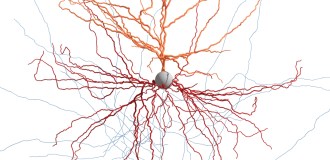 Health & Medicine
Health & MedicineHow pieces of live human brain are helping scientists map nerve cells
Experiments on live nerve cells — donated from patients undergoing brain surgery — may turn up clues about how the human brain works.
-
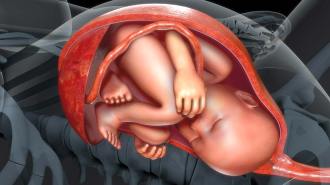 Health & Medicine
Health & MedicineA new study challenges the idea that the placenta has a microbiome
A large study of more than 500 women finds little evidence of microbes in the placenta, contrary to previous reports on the placental microbiome.
-
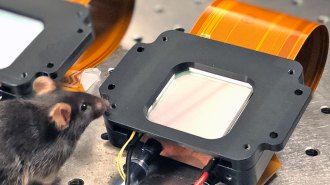 Health & Medicine
Health & MedicineManipulating nerve cells makes mice ‘see’ something that’s not there
Using optogenetics to stimulate about 20 nerve cells causes mice to perceive nonexistent vertical or horizontal lines.
-
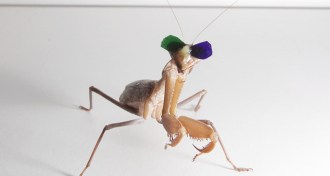 Health & Medicine
Health & MedicineTiny glasses help reveal how praying mantises can see in 3-D
Newfound nerve cells in praying mantises help detect different views that each of the insects’ eyes sees, a mismatch that creates depth perception.
-
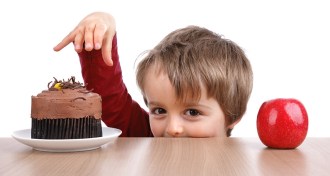 Health & Medicine
Health & MedicineToddlers tend to opt for the last thing in a set, so craft your questions carefully
Two-year-olds demonstrate a verbal quirk that makes their answers less reliable.
-
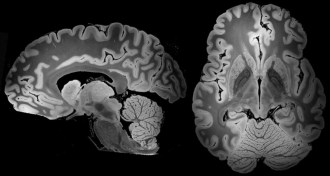 Neuroscience
NeuroscienceA 100-hour MRI scan captured the most detailed look yet at a whole human brain
Researchers report ultraprecise imaging of a postmortem human brain.
-
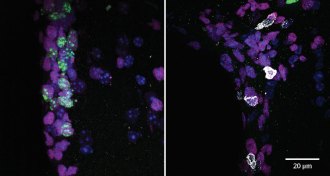 Health & Medicine
Health & MedicineRogue immune cells can infiltrate old brains
Killer T cells get into older brains where they may make mischief, a study in mice and postmortem human brain tissue finds.
-
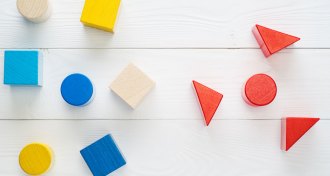 Health & Medicine
Health & MedicineVision cells can pull double duty in the brain, detecting both color and shape
Neurons in a brain area that handles vision fire in response to more than one aspect of an object, countering earlier ideas, a study in monkeys finds.
-
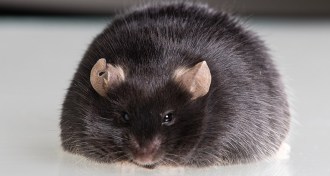 Health & Medicine
Health & MedicineIn mice, a high-fat diet cuts a ‘brake’ used to control appetite
A fatty diet changes the behavior of key appetite-regulating cells in a mouse brain.
-
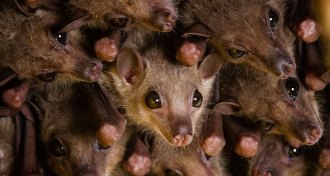 Neuroscience
NeuroscienceMice and bats’ brains sync up as they interact with their own kind
The brain activity of mice and bats aligns in social settings, a coordination that may hold clues about how social context influences behavior.
-
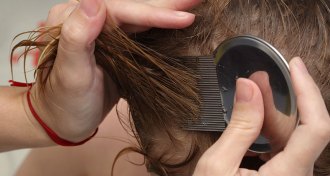 Health & Medicine
Health & MedicineWhen fighting lice, focus on kids’ heads, not hats or toys
Learning a little about lice makes for a more efficient battle against the bugs.
-
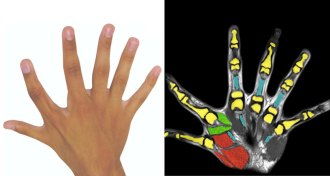 Health & Medicine
Health & MedicineExtra fingers, often seen as useless, can offer major dexterity advantages
Two people born with six fingers on each hand can control the extra digit, using it to do tasks better than five-fingered hands, a study finds.